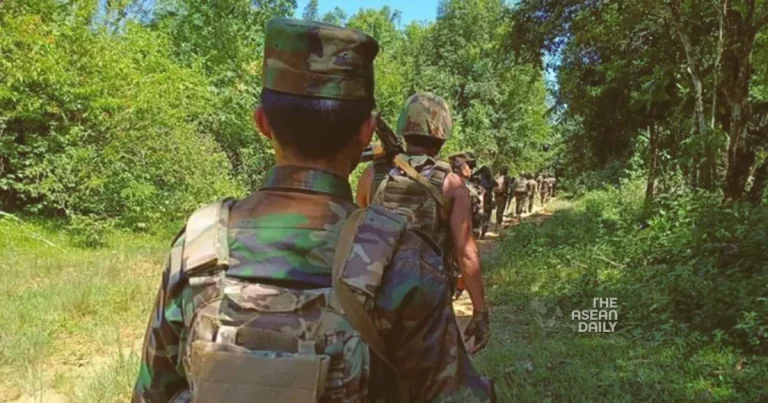More than two years have passed since Myanmar’s military staged a coup and ousted the democratically-elected government, plunging the Southeast Asian nation into turmoil. In that time, the junta has committed unthinkable atrocities in its efforts to crush all opposition. Yet through it all, the regime’s neighbours have maintained an uneasy balance, engaging with the generals while stopping short of outright condemnation.
However, recent developments indicate the tide may be turning against the military. Resistance forces comprising militias and People’s Defence Forces are gaining strength, inflicting serious casualties and reclaiming territory long held by the junta. Meanwhile, the regime appears to be spiralling into crisis, struggling with low morale, desertions, and all the hallmarks of a military overextended.
As the junta’s grip on power slips, Myanmar’s neighbours would be wise to re-examine their approaches. With the regime fighting for its very survival, continued engagement risks alienating the Myanmar people and jeopardising strategic interests in a potential post-junta landscape. More can and should be done to support the forces battling tyranny on the frontlines. It’s time for neighbours like China, India, and Thailand to recalibrate their stances and get on the right side of history.
Signs of strain have long been apparent within the Tatmadaw, as Myanmar’s military is known. Battle-hardened ethnic armies and newly formed PDFs have mobilised against the well-heeled but poorly led junta troops. With supply lines disrupted, the regime has struggled to maintain its grip beyond major communication arteries.
Recent weeks have seen some of the junta’s most humiliating reversals to date. In Chin State bordering India, joint PDF-militia offensives retook dozens of towns with shocking speed and ease. PDFs and allied ethnic minority groups have engaged in intense battles with the Myanmar army in and around Loikaw, a city nestled in the hills of Kayah state, with approximately 50,000 residents.
Such setbacks underscore the junta’s rapidly declining combat effectiveness. Low pay, poor conditions, and the military’s own brutality have bred rampant desertion. Meanwhile, resistance groups operating with local community support grow emboldened with each win. More territories are being wrested from regime hands by the day.
Of course, total victory still eludes pro-democracy forces for now. The military retains air power, heavy artillery and control of major population centers that allow continued atrocities. However, the strategic tide appears to have turned after over two long years of conflict. Myanmar’s oppressed people sense regime change may at last be within reach.
For the country’s neighbours, this shifting landscape demands a rethink. All have pursued complex, intertwined relationships with Myanmar since before the coup based on strategic investments and security concerns. Yet continued overtures to an increasingly illegitimate and failing junta risk destroying goodwill with Myanmar’s people when stability returns.
Nowhere is this truer than China, whose vast economic leverage in Myanmar is the envy of competitors. Beijing’s continued engagement with the coup leaders, while not outright backing them, leaves a sour taste. Like it or not, public sentiment could well demand China pay penance for its studied neutrality when help was most needed to depose a brutal regime.
Further sanctions evasion to prop up the junta also threatens China’s investments on Myanmar’s coastlines and oil/gas pipelines crossing its southern frontier. As fighting expands, supply disruptions and territorial losses loom. Going forward, China would be wise to pressure partners like Russia not to enable the junta from the shadows. Some overt displays of pro-democracy sympathy would help too when dealing with a post-junta Myanmar.
India faces similar dilemmas. Despite its geostrategic interests in curbing Chinese influence, continued engagement with the junta undermines New Delhi’s stated goals of stability and development for its remote northeast. The regime meanwhile has given safe harbour to insurgent groups targeting India from across the porous border. With resistance momentum building, stronger displays of solidarity would repay India well once fighting subsides.
Not that engagement should cease entirely. Neighbours including Thailand have legitimate interests in maintaining essential gas imports and overland transit routes. But the reputational risks of being seen to enable atrocity demand a more balanced approach. Calibrated humanitarian support for fleeing refugees and covert material aid could make a real difference on the battlefield without destroying vital economic ties.
As signs point to the junta spiralling into disarray against a populace increasingly rising up, the calculus for Myanmar’s neighbours is shifting. Continued overt engagement risks poisoned relations and strategic exposure post-coup. More robust, covert backing for democratic forces battling tyranny, on the other hand, offers a chance at securing influence when stability returns. Regardless of past policy missteps, it’s not too late for neighbours to get on the right side of history.




